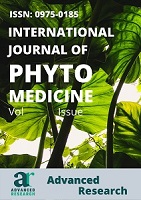Phytochemical evaluation and antioxidant assay of ethanolic extracts of traditional medicinal plants (Ferula assafoetida, Saussurea costus, Peganum harmala) in oman
Keywords:
Phytochemical evaluation, antioxidant study, phosphomolybdate assay, free radical scavengingAbstract
Ferula assafoetida, Saussurea costus and Peganum harmala are considered an important traditional folk medicines in Oman, extracts of these plants were screened for assessing bioactive phytochemical constituents and their antioxidant property. Total phenolic and flavonoid contents were evaluated to explore the reliable and potential sources of novel natural antioxidants. Preliminary phytochemical screening of different plant extracts and phytochemical investigation showed variations in the presence and amount of active ingredients. All the fractions of P.harmala, S.costus and F.assafoetida have flavonoid and phenolic compounds, whereas, the highest amount was found in F.assafoetida which was 0.370, 0.053 mg/ml respectively. Under antioxidant study the H2O2 free radical scavenging potential and Phosphomolybdate assay were studied in vitro for the determination of antioxidant activity. However S. costus extract showed the highest scavenging percentages 89%. In Phosphomolybdate assay Ferula assafoetida has a very good antioxidant potential due to phenolic and flavonoid components.
References
. Halliwell B, Gutteridge JMC, Cross CE.
Free radicals, antioxidants and human
disease: where are we now? J. Lab.
Clin. Med.1992;119: 598–620.
. Cao GH, Sofic E, Prior RL. Antioxidant
capacity of tea and vegetables. J. Agri.
Food Chem.1996;44:3426–3431.
. Wang H, Liu T, Chen Y, Shiuan D.
Protective effect of freeze-dried extract
of vegetables and fruits on the
hydroxyl radical-mediated oxidative
damage of DNA and decrease of
erythrocytes deformability. Appl.
Biochem. Biotechnol. 2007; 141(2-3):
-249.
. Zheng W, Wang S. Antioxidant activity
and phenolic composition in selected
herbs. J. Agr. Food Chem. 2001;49:
–5170.
. Sobhani AM, Ebrahimi SA, Hoormand
M, Rahbar N, Mahmoudian M.
Cytotoxicity of Peganum harmala L.
seeds extract and its relationship with
contents of β-carboline alkaloids. J.
Iran Univ. Med. Sci. 2000; 8: 432-438.
. Lamchouri F, Settaf A, Cherrah Y,
Hasser M, Zemzami M, Arif N, Nadori
EB, Zaid A, Lyoussi B. In vitro cell
toxicity of Peganum harmala alkaloids
on cancerous cell lines. Fitoterapia.
;71: 50-54.
. Adell A, Biggs TA, Myers RD. : Action
of human 1-methyl- b-carboline on the
brain: Body temperature and in vivo
efflux of 5-HT from hippocampus of the
rat. Neuropharmacology, 1996;
:1101-1107.
. Baum SS, Hill R, Rommelspacher H.
Harman-induced changes of
extracellular concentrations of
neurotransmitters in the nucleus
accumbens of rats. Eur. J.
Pharm,1996; 314: 75-82.
. Tse, SYH, Mak IT,
DickensBF.Antioxidative properties of
harman and b-carboline alkaloids.
Biochem.Pharmacol.1991:42: 459-464.
. Fernch D. Ethnobothany of the
Umbelliferae. In Heywood. VH, ed.,
The Chemistry and Biology of the
Umberifella. Academic press,
London.1971; 285-412.
. Fatehi M, Farifteh F, FatehiHassanabad Z. Antispasmodic and
hypertensive effects of
Ferulaasafoetida gum extract. Journal
of Ethnopharmacol.2004;91:321-324.
. Chandra PK, Yashwant SR, Santaram
SO, Jagdish CK, Subhash C. R.
Vishvakarma. "Kuth (Saussurealappa)
cultivation in the cold desert
environment of the Lahaul valley,
northwestern Himalaya, India: arising
threats and need to revive socioeconomic values". Biodiversity and
Conservation.2005;14 (5): 1035.
. Dahanuka SA, Kulkarni RA, Rege NN.
Pharmacology of medicinal plants and
natural products. Indian J.
Pharmacol.2000; 32: 81-118.
. Farombi EO, Fakoya A. Free radical
scavenging and antigenotoxic activities
of natural phenolic compounds in dried
flowers of Hibiscus sabdariffa. Mol.
Nutr. Food Res.2005; 49:1120-1128.
. Okeke IN, Lamikanra A, Edelma R .
Socioeconomic and behavioural
factors leading to acquired bacterial
resistance to antibiotics in developing
countries. Emerg. Infect. Dis.1999; 5:
-27.
. Odebiyi A, Sofowora AE.
Phytochemical screening of Nigerian
Medical Plants. Part II, Lloydia,
;41: 234-246.
. Handa S, Khanuja S, Longo G,
Rakesh D.Extraction technologies for
medicinal and aromatic plants,
International center for science and
high technology.2008.
. Ogunleye DS, Ibitoye SF. Studies of
antimicrobial activity and chemical
constituents of Ximenia americana.
Trop J Pharm Res. 2003; 2(2):239–
. Ebrahimzadeh MA, Pourmorad F,
Bekhradnia AR .Iron chelating activity
screening phenol and flavonoid
content of some medicinal plants from
Iran. Afr.J. Biotechnol. 2008;32: 43-49.
. Oktay M, Gülçin I, Küfrevioglu ÖI.
Determination of in vitro antioxidant
activity of fennel (Foeniculum vulgare)
seed extracts. LebensmittelWissenchaft and Technologie.2003;
: 263–27.
. Ruch RJ, Cheng SJ, Klaunig JE.
Prevention of cytotoxicity and inhibition
of intercellular communication by
antioxidant catechins isolated from
Chinese green tea. Carcinogen.1989;
:1003–1008.
. Motar ML, Thomas G, Barbosa Fillo
JM. Effects of Anacardium occidentale
stem bark extract on in vivo
inflammatory models. J.
Ethnopharmacol. 1985;95(2-3):139-42.
. Thuong PT, Hung TM, Ngoc TM, Ha
do T, Min BS, Kwack SJ, Kang TS,
Choi JS, Bae K. Antioxidant activities
of coumarins from Korean medicinal
plants and their structure-activity
relationships. Phytother Res. 2010;
:101–106.
. Decorti RC, Creacy WA. In the
Cantharadus Alkaloids.In Macel
Dekker.Edited by Taylor W, Fanworths
NR. New York: Taylor W1 and
Fanworths NR Publishers. 1975; 237–
. Cheeke PP. Saponins: surprising
benefits of desert plants,4-5. In: The
Linus Pauling Institute Newsletter,
ORCorvallis (Ed), Oregon State
University Press, Oregon(1998).
. Kessler M, Ubeaud G, Jung L. Antiand pro-oxidant activity of rutin and
quercetin derivatives. J. Pharm.
Pharmacol.2003;55: 131-142.
. Cook NC, Samman S. Flavonoidschemistry, metabolism,
cardioprotective effects, and dietary
sources.Nutr.Biochem.1996; 7: 66-76.
. Shahidi F, Wanasundara PKJPD.
Phenolic antioxidants. Crit. Rev. Food
Sci. Nutr.1992;32: 67-103.
. Das NP, Pereira TA. Effects of
flavonoids on thermal autoxidation of
Palm oil: structure- activity relationship.
J. Am. Oil Chem. Soc.1990; 67: 255-
. Younes M. Inhibitory action of some
flavonoids on enhanced spontaneous
lipid peroxidation following glutathione
depletion. Plant Med.1981; 43: 240-
. Aarons DH, Rossi GJ, Orzechowski
RF. Cardiovascular actions of three
harmal alkaloids, harmine, harmaline
and harmalol. J. Pharm. Sci, 1977;
: 1244-1248.
. Keshri G, Bajpai M, Lakshmi V,
Sreenivasulu Setty B, Gupta G. Role of
energy metabolism in the pregnancy
interceptive action of Ferula
assafoetida and Melia azedarach
extracts in rat, Contraception.2004;70:
- 432.
. Leung AY. Encyclopedia of Common
Natural Ingredients used in Food,
Drugs and Cosmetics. Wiley, New
York 1980.
. Umamaheswari M, Chatterjee TK. In
vitro antioxidant activities of the
fractions of Coccinniagrandis L. leaf
extract. Afr J Trad Compl Altern Med.
; 5(1):61–73.
. Yamada M, Hayashi KI, Hayashi H,
Ikedaet S, Hoshino T, Tsutsui K,
Iinuma M and Nozaki H. Stilbenoids of
Kobresianepalensis (Cyperaceae)
exhibiting DNA topoisomerase II
inhibition.
Phytochemistry,2006;67:307-313.



